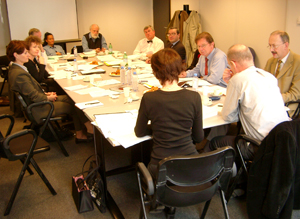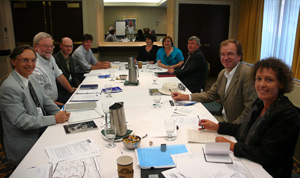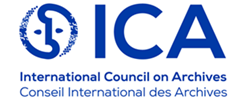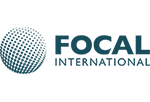 Meeting of the CCAAA Board at the Netherlands Institute for Sound and Vision in Hilversum, Netherlands, in March 2015
Meeting of the CCAAA Board at the Netherlands Institute for Sound and Vision in Hilversum, Netherlands, in March 2015
Who We Are
The CCAAA represents the interests of worldwide professional archive organisations with interests in audiovisual materials including films, broadcast television and radio, and audio recordings of all kinds. Although predominantly working in the public sector, we reflect a broad range of interests across the broadcast media, arts, heritage, education and information sectors. The professional archivists that the CCAAA ultimately represents work in institutions such as archives, libraries and museums at national and local level, university teaching and research departments, and broadcasting organisations.
A Brief History of the CCAAA
The Coordinating Council of Audiovisual Archives Associations (CCAAA) traces its origins to the Roundtable of Audiovisual Records, which was organized in 1981 in response to the UNESCO report Recommendation for the Safeguarding and Preservation of Moving Images (1980)1. The report called for cooperation and coordination between organizations tasked with preserving the world's audiovisual heritage. The five founding members were:
- International Federation of Film Archives (FIAF)
- International Federation of Television Archives (FIAT/IFTA).
- International Federation of Library Associations and Institutions (IFLA)
- International Association of Sound Archives (IASA)
- International Council on Archives (ICA)
The Minutes of the very first meeting of the Round Table can be accessed here. A major early project was organizing a Joint Technical Symposium of preservation experts from around the world, to be held every few years. The first JTS was held in Stockholm in 1983, with later editions in Berlin (1987), Ottawa (1990), London (1995), and Paris (2000). The Roundtable also produced papers on archival matters, and worked closely with UNESCO on audiovisual preservation.
By 1999 it was felt that the Roundtable needed to become more proactive in shaping policy in the audiovisual archival field, to include lobbying for greater preservation efforts worldwide. To accomplish this it was reconstituted as the CCAAA in 2000, and new members were added. These included the Association of Moving Image Archivists (AMIA, 2002), the Southeast Asia-Pacific Audiovisual Archive Association (SEAPAVAA, 2002), the Association for Recorded Sound Collections (ARSC, 2007), and the Federation of Commercial Audiovisual Libraries (FOCAL, 2011). During that period, some of the CCAAA member-associations discontinued their membership for a few years.
The Joint Technical Symposia continued, with new conferences held in Toronto (2004, 2007), Oslo (2010), Singapore (2016), and Hilversum (2019). The CCAAA organizes and promotes the "World Day for Audiovisual Heritage" (celebrated on 27 October each year since 2007) on behalf of UNESCO. It has also launched an "Archives at Risk" initiative to aid endangered archives, and taken positions on subjects as diverse as the impact of copyright on preservation and access and the repatriation of audiovisual heritage items to originating countries.
In October 2024, FOCAL International withdrew from CCAAA as its activities had diverged significantly from those of the association.
Since the CCAAA is an "association of associations," its Board membership generally consists of the President and secretary general, or any other person officially mandated by each of its member organizations to represent it. The Chair of the Board rotates among the members, and there is also a Secretary General and a treasurer. With the exception of the Secretary General, all positions are held by volunteers.
The current Chair (2024-2025) of the CCAAA is Karen Chan, President of SEAPAVAA (Southeast Asia-Pacific Audiovisual Archive Association).
Past Chairs of the CCAAA were:
Toby Seay (IASA, 2022-2023)
Mary Egan (FOCAL, 2020-2021)
Rachael Stoeltje (FIAF, 2018-19)
Jan Mueller/Brid Dooley (FIAT-IFTA, 2016-2017)
Tim Brooks (ARSC, 2014-2015)
Caroline Frick (AMIA, 2012-2013)
Tuenjai “Lek” Sinthuvnik/Bee Thiam Tan (SEAPAVAA, 2011)
Herbert Hayduck (FIAT-IFTA, 2010)
Bruce Royan (IFLA, 2009)
Joan van Albada (ICA, 2008)
Richard Green (IASA, 2007)
Eva Orbanz (FIAF, 2006)
Milt Shefter (AMIA, 2005)
Belina Capul (SEAPAVAA, 2004)
Emmanuel Hoog (FIAT-IFTA, 2003)
Ray Edmondson (SEAPAVAA, September 2002)
Sjoerd Koopmann (IFLA, March 2002)
Karl Griep (ICA, 2001)
A.C. Jewitt (IASA, 2000)
This introduction is partly based on Benedict S. Olgado, "Creating and Sustaining a Platform for Discourse and Cooperation; The History, Development and Future Direction of CCAAA" (2011).
 Meeting of the CCAAA Board at the Netherlands Institute for Sound and Vision in Hilversum, Netherlands, in March 2015
Meeting of the CCAAA Board at the Netherlands Institute for Sound and Vision in Hilversum, Netherlands, in March 2015
Who We Are
The CCAAA represents the interests of worldwide professional archive organisations with interests in audiovisual materials including films, broadcast television and radio, and audio recordings of all kinds. Although predominantly working in the public sector, we reflect a broad range of interests across the broadcast media, arts, heritage, education and information sectors. The professional archivists that the CCAAA ultimately represents work in institutions such as archives, libraries and museums at national and local level, university teaching and research departments, and broadcasting organisations.
A Brief History of the CCAAA
The Coordinating Council of Audiovisual Archives Associations (CCAAA) traces its origins to the Roundtable of Audiovisual Records, which was organized in 1981 in response to the UNESCO report Recommendation for the Safeguarding and Preservation of Moving Images (1980)1. The report called for cooperation and coordination between organizations tasked with preserving the world's audiovisual heritage. The five founding members were:
- International Federation of Film Archives (FIAF)
- International Federation of Television Archives (FIAT/IFTA).
- International Federation of Library Associations and Institutions (IFLA)
- International Association of Sound Archives (IASA)
- International Council on Archives (ICA)
The Minutes of the very first meeting of the Round Table can be accessed here. A major early project was organizing a Joint Technical Symposium of preservation experts from around the world, to be held every few years. The first JTS was held in Stockholm in 1983, with later editions in Berlin (1987), Ottawa (1990), London (1995), and Paris (2000). The Roundtable also produced papers on archival matters, and worked closely with UNESCO on audiovisual preservation.
By 1999 it was felt that the Roundtable needed to become more proactive in shaping policy in the audiovisual archival field, to include lobbying for greater preservation efforts worldwide. To accomplish this it was reconstituted as the CCAAA in 2000, and new members were added. These included the Association of Moving Image Archivists (AMIA, 2002), the Southeast Asia-Pacific Audiovisual Archive Association (SEAPAVAA, 2002), the Association for Recorded Sound Collections (ARSC, 2007), and the Federation of Commercial Audiovisual Libraries (FOCAL, 2011). During that period, some of the CCAAA member-associations discontinued their membership for a few years.
The Joint Technical Symposia continued, with new conferences held in Toronto (2004, 2007), Oslo (2010), Singapore (2016), and Hilversum (2019). The CCAAA organizes and promotes the "World Day for Audiovisual Heritage" (celebrated on 27 October each year since 2007) on behalf of UNESCO. It has also launched an "Archives at Risk" initiative to aid endangered archives, and taken positions on subjects as diverse as the impact of copyright on preservation and access and the repatriation of audiovisual heritage items to originating countries.
In October 2024, FOCAL International withdrew from CCAAA as its activities had diverged significantly from those of the association.
Since the CCAAA is an "association of associations," its Board membership generally consists of the President and secretary general, or any other person officially mandated by each of its member organizations to represent it. The Chair of the Board rotates among the members, and there is also a Secretary General and a treasurer. With the exception of the Secretary General, all positions are held by volunteers.
The current Chair (2024-2025) of the CCAAA is Karen Chan, President of SEAPAVAA (Southeast Asia-Pacific Audiovisual Archive Association).
Past Chairs of the CCAAA were:
Toby Seay (IASA, 2022-2023)
Mary Egan (FOCAL, 2020-2021)
Rachael Stoeltje (FIAF, 2018-19)
Jan Mueller/Brid Dooley (FIAT-IFTA, 2016-2017)
Tim Brooks (ARSC, 2014-2015)
Caroline Frick (AMIA, 2012-2013)
Tuenjai “Lek” Sinthuvnik/Bee Thiam Tan (SEAPAVAA, 2011)
Herbert Hayduck (FIAT-IFTA, 2010)
Bruce Royan (IFLA, 2009)
Joan van Albada (ICA, 2008)
Richard Green (IASA, 2007)
Eva Orbanz (FIAF, 2006)
Milt Shefter (AMIA, 2005)
Belina Capul (SEAPAVAA, 2004)
Emmanuel Hoog (FIAT-IFTA, 2003)
Ray Edmondson (SEAPAVAA, September 2002)
Sjoerd Koopmann (IFLA, March 2002)
Karl Griep (ICA, 2001)
A.C. Jewitt (IASA, 2000)
This introduction is partly based on Benedict S. Olgado, "Creating and Sustaining a Platform for Discourse and Cooperation; The History, Development and Future Direction of CCAAA" (2011).














